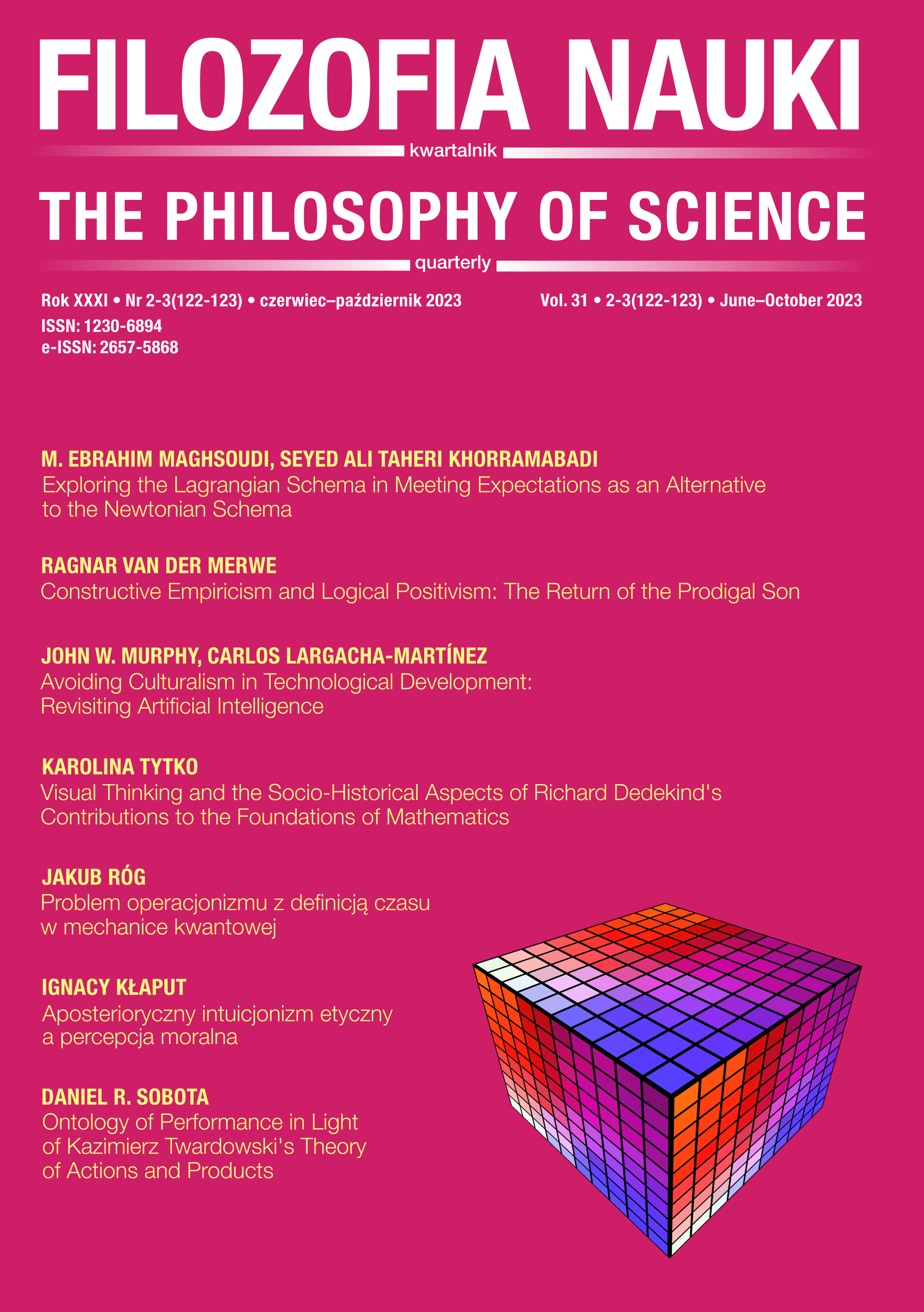Aposterioryczny intuicjonizm etyczny a percepcja moralna
DOI:
https://doi.org/10.14394/filnau.2023.0015Słowa kluczowe:
moral perception, a posteriori ethical intuitionism, foundationalism, cognitive penetration, moral skepticism, evolutionary debunking argumentAbstrakt
A posteriori ethical intuitionism is the view that our ethical beliefs can be justified non-inferentially, with such justification acquired through experience. To support this view, one can appeal to moral perception – an ability that enables us to perceive moral properties and thereby provides perceptual justification for our ethical beliefs. In this paper, I analyze various accounts of moral perception and their potential relevance to the foundationalist project of a posteriori ethical intuitionism. The analysis identifies affective intuitionism as the most promising approach in this context. In the remainder of the article, I examine the challenges posed by the cognitive penetration of moral perception. I argue that, for proponents of a posteriori ethical intuitionism, the best response is to acknowledge the existence of certain innate mechanisms underlying moral perception. I also aim to show that such a solution does not necessarily undermine the validity of ethical theory or the importance of ethical development in our moral lives. Finally, I present possible strategies for defending a posteriori ethical intuitionism against the so-called evolutionary debunking argument, which questions the reliability of moral perception.
Bibliografia
Alspector-Kelly M. (2004), Seeing the Unobservable: Van Fraassen and the Limits of Experience, „Synthese” 140(3), 331–353. https://doi.org/10.1023/B:SYNT.0000031323.19904.45
Audi R. (2013), Moral Perception, Princeton: Princeton University Press.
Audi R. (2015), Moral Perception Defended, „Argumenta” 1, 5–28.
Brady M. S. (2010), Virtue, Emotion, and Attention, „Metaphilosophy” 41(1), 115–131. https://doi.org/10.1111/j.1467-9973.2009.01620.x
Broad C. D. (1930), Five Types of Ethical Theory, London: Routledge & Kegan Paul Ltd.
Buyukozer Dawkins M., Sloane S., Baillargeon R. (2019), Do Infants in the First Year of Life Expect Equal Resource Allocations?, „Frontiers in Psychology” 10, 116, https://psycnet.apa.org/doi/10.3389/fpsyg.2019.00116
Cowan R. (2012), “Intuition, Perception, and Emotion: A Critical Study of the Prospects for Contemporary Ethical Intuitionism”, rozprawa doktorska, University of Glasgow, http://theses.gla.ac.uk/3296/
Faraci D. (2015), A Hard Look at Moral Perception, „Philosophical Studies” 172(8), 2055–2072. https://doi.org/10.1007/s11098-014-0397-6
Fraassen B. van (1980), The Scientific Image, New York: Oxford University Press.
Greco J. (2000), Putting Skeptics in Their Place: The Nature of Skeptical Arguments and Their Role in Philosophical Inquiry, Cambridge: Cambridge University Press.
Gross S. (2017), Cognitive Penetration and Attention, „Frontiers in Psychology” 8, 221. https://doi.org/10.3389/fpsyg.2017.00221
Haidt J. (2001), The Emotional Dog and Its Rational Tail: A Social Intuitionist Approach to Moral Judgment, „Psychological Review” 108(4), 814–834. https://doi.org/10.1037/0033-295X.108.4.814
Haidt J., Björklund F., Murphy S. (2000), Moral Dumbfounding: When Intuition Finds no Reason, https://polpsy.ca/wp-content/uploads/2019/05/haidt.bjorklund.pdf.
Hamlin J. K., Wynn K., Bloom P. (2007), Social Evaluation by Preverbal Infants, „Nature” 450, 557–559. https://doi.org/10.1038/nature06288
Harman G. (1977), The Nature of Morality: An Introduction to Ethics, New York: Oxford University Press.
Hills A. (2010), Moral Epistemology, [w:] New Waves in Metaethics, M. Brady (red.), New York: Palgrave-Macmillan, 249–263.
Hull G. (2015), Tracking the Moral Truth: Debunking Street’s Darwinian Dilemma, https://philarchive.org/rec/HULTTM-2.
James W. (1884), What is an Emotion?, „Mind” 9(34), 188–205. https://doi.org/10.1093/mind/os-IX.34.188
Jin K., Houston J., Baillargeon R., Groh A., Roisman G. (2018), Young Infants Expect an Unfamiliar Adult to Comfort a Crying Baby: Evidence from a Standard Violation-of-Expectation Task and a Novel Infant-Triggered-Video Task, „Cognitive Psychology” 102, 1–20. https://doi.org/10.1016/j.cogpsych.2017.12.004
Kauppinen A. (2013), Review of Robert Audi’s Moral Perception, „Notre Dame Philosophical Reviews”, https://ndpr.nd.edu/news/moral-perception/.
Macpherson F. (2011), Individuating the Senses, [w:] The Senses: Classic and Contemporary Philosophical Perspectives, F. Macpherson (red.), New York: Oxford University Press, 3–43.
McGregor R. (2015), Making Sense of Moral Perception, „Ethical Theory and Moral Practice” 18(4), 745–758. https://doi.org/10.1007/s10677-015-9601-9
Murdoch I. (1970), The Sovereignty of Good, New York: Schocken Books.
Nussbaum M. C. (2001), Upheavals of Thought: The Intelligence of Emotions, Cambridge: Cambridge University Press.
Prinz J. (2007), Can Moral Obligations Be Empirically Discovered?, „Midwest Studies in Philosophy” 31(1), 271–291. https://doi.org/10.1111/j.1475-4975.2007.00148.x
Quine W. V. O. (1951), Main Trends in Recent Philosophy: Two Dogmas of Empiricism, „Philosophical Review” 60(1), 20–43. https://doi.org/10.2307/2181906
Sloane S., Baillargeon R., Premack D. (2012), Do Infants Have a Sense of Fairness?, „Psychological Science” 23(2), 196–204. https://doi.org/10.1177/0956797611422072
Solomon R. (1980), Emotions and Choice, [w:] Explaining Emotions, A. Rorty (red.), Los Angeles: University of California Press, 251–281.
Stich S. (1978), Beliefs and Subdoxastic States, „Philosophy of Science” 45(4), 499–518. https://doi.org/10.1086/288832
Street S. (2006), A Darwinian Dilemma for Realist Theories of Value, „Philosophical Studies” 127(1), 109–166. https://doi.org/10.1007/s11098-005-1726-6
Szutta A. (2018), Intuicje moralne. O poznaniu dobra i zła, Lublin: Wydawnictwo Academicon.
Van de Vondervoort J. W., Hamlin J. K. (2016), Evidence for Intuitive Morality: Preverbal Infants Make Sociomoral Evaluations, „Child Development Perspectives” 10, 143–148. https://doi.org/10.1111/cdep.12175
Väyrynen P. (2018), Doubts about Moral Perception, [w:] Evaluative Perception, A. Bergqvist, R. Cowan (red.), Oxford: Oxford University Press, 109–128.
Vetter P., Newen A. (2014), Varieties of Cognitive Penetration in Visual Perception, „Consciousness and Cognition” 27, 62–75. https://doi.org/10.1016/j.concog.2014.04.007
Werner P. J. (2016), “Seeing Right from Wrong: A Defense of A Posteriori Ethical Intuitionism”, rozprawa doktorska, Syracuse University, https://surface.syr.edu/etd/532/?utm_source=surface.syr.edu%2Fetd%2F532&utm_medium=PDF&utm_campaign=PDFCoverPages
Werner P. J. (2018), Moral Perception without (Prior) Moral Knowledge, „Journal of Moral Philosophy” 15(2), 164–181. https://doi.org/10.1163/17455243-46810075
Wheatley T., Haidt J. (2005), Hypnotic Disgust Makes Moral Judgments More Severe, „Psychological Science” 16(10), 780–784. https://doi.org/10.1111/j.1467-9280.2005.01614.x
Zahavi D., Overgaard S. (2012), Empathy without Isomorphism: A Phenomenological Account, [w:] Empathy from Bench to Bedside, J. Decety (red.), Cambridge: MIT Press, 3–20.
Pobrania
Opublikowane
Jak cytować
Numer
Dział
Licencja
Prawa autorskie (c) 2023 Ignacy Kłaput

Utwór dostępny jest na licencji Creative Commons Uznanie autorstwa – Użycie niekomercyjne – Bez utworów zależnych 4.0 Międzynarodowe.



















 Filozofia Nauki | ISSN 1230-6894 | e-ISSN 2657-5868
Filozofia Nauki | ISSN 1230-6894 | e-ISSN 2657-5868